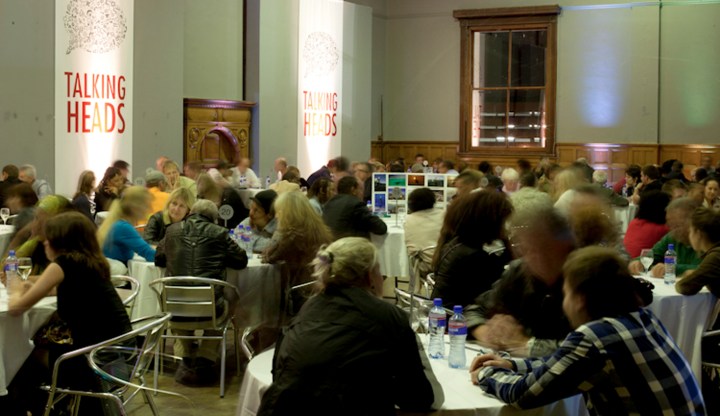South Africa
Speed-dating. For thinkers.

It’s described as “Wikipedia on steroids”. There are 50 thought leaders, experts and mavericks sitting at different tables around the room. You have the chance of four 20-minute conversations, and you don’t know who you’ll be talking to. REBECCA DAVIS found out a little more about the Africa Centre’s Talking Heads Live events, which kick off this weekend.
The Africa Centre is a pretty interesting beast. Established in 2005, it has a lofty mandate: “To utilise art and culture generated in Africa and the diaspora to create positive change,” Talking Heads curator Robin Jutzen tells the Daily Maverick. Each of their projects has a different way of fulfilling this ambitious aim.
The Badilisha Poetry X-Change, for instance, aims to correct the situation whereby African poetry previously had no centralised repository online, often limiting the readership to foreign publications and academics, meaning that young African pupils are often likely to be exposed to the works of Wordsworth before Jack Mapanje. Badilisha’s intervention in this regard has involved international poetry festivals, seminars and training programmes, as well as its core business of running an internet radio station that releases two podcasts a week profiling African poets.
Then there’s the more high-profile Infecting the City programme, an annual public art festival in Cape Town that sees communal spaces become sites for provocative performance and art work. The aim is twofold: to encourage citizens to reappraise their urban surroundings, and their relationship with them, and to unearth “hidden treasures within the city”, according to Jutzen.
The Talking Heads Live project grew out of Infecting the City, Jutzen says, because they realised that one of the kinds of “hidden treasures” waiting to be unearthed were people’s minds. The motivation behind Talking Heads is an attempt to correct the skewed vision often presented of Africa as a continent redolent with crime, disease and general negativity.
“We wanted to create a platform for African thought-leaders to share their ideas in order for people to realise that there is a great deal of positive innovation on the continent,” Jutzen says.
The Talking Heads concept is similar to the idea of “World Café”, a way of sharing ideas among groups, which was conceived in 1995 by Californians Juanita Brown and David Isaacs. On the World Cafe website they explain what happened: “With their plan for a morning large-circle dialogue disrupted by rain, the two dozen participants spontaneously formed into small, intimate table conversations about the questions that had drawn them together… They periodically interrupted these conversations to switch tables so the insights and ideas that had real power might circulate, deepen, and connect…Over the course of the morning, the innovative process they improvised gave birth to an experience of collective intelligence that transformed the depth, scope and innovative quality of their collaboration.”
The initial World Café experience brought together people of equal standing and expertise, which is one of the differences from the Talking Heads project. Talking Heads works by first choosing a group of 40 to 50 “knowledge brokers”, which Jutzen divides into the categories of experts, thought leaders and mavericks. Experts are self-explanatory, thought leaders Jutzen defines as “people who push boundaries within their areas”, and the mavericks are “younger people, not as established, who nonetheless have a hunch that there’s a better way to do things”.
Once these individuals are confirmed as speakers, an interesting venue is chosen – in the case of Cape Town this year, it’s the National Gallery, for Johannesburg it’s the Villa Arcadia – and then no more than 100 tickets are sold to members of the public. When they arrive on the night, each guest is given a card that entitles them to four conversational sessions of 20 minutes each. They have no way of choosing with whom their conversation will take place: a computer randomly assigns them to a table. At each table, there are three audience members and one speaker. The speaker shares his or her “big idea” with the three listeners for 10 minutes, and in the remaining time there is the chance for conversation and questions, before the bell rings to signal that time is up.
“The speakers spend two sessions talking, and then one listening,” says Jutzen, so your fellow audience members at a table are likely to include at least one speaker. Jutzen says they are still experimenting with the optimal size of each conversation, but he believes four people is about right in order to generate a satisfying dialogue. “One on one is a bit intimidating,” he says.
So who’s on the menu for this year’s events? In Cape Town, speakers include activist Zackie Achmat, provincial Cosatu leader Tony Ehrenreich, Tertiary School in Business Administration (TSiBA) co-founder Leigh Meinert, and refugee rights activist Braam Hanekom.
In Johannesburg you’ll find the likes of SA Human Genome Project’s Michele Ramsay, biomedical scientist Bavesh Kana, University of Johannesburg dean of engineering Tshilidzi Marwala, and water expert Anthony Turtin.
One obvious question remains: what happens if you get assigned to a table featuring a speaker talking about a topic in which you have no interest? Jutzen is adamant: “It never happens. Partly because all the people who attend are interested in ideas, but also because the talking heads are all compelling speakers. Besides, you always have the opportunity to steer the conversation towards a topic which interests you more.” DM
The Talking Heads event in Cape Town takes place on 14 July 2012 and in Johannesburg on 21 July 2012
Read more:
- Talking heads in Cape Town and Jozi, on the Africa Centre website
Photo: Talking Heads Live Cape Town 2011

















 Become an Insider
Become an Insider